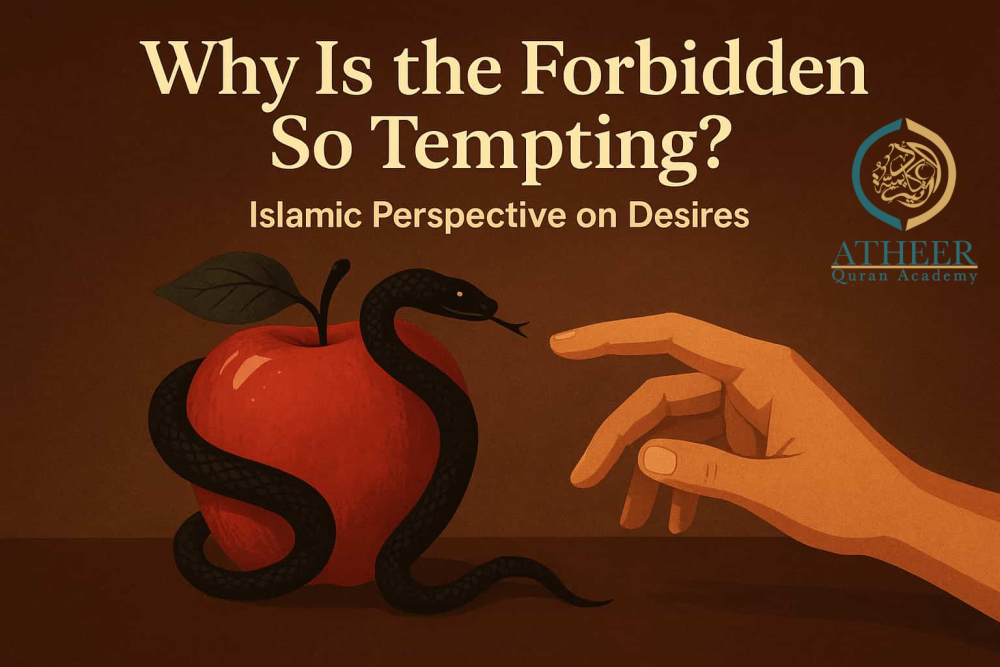Post Detail

"Why Do Humans Desire the Forbidden? Exploring Psychology, Faith, and the Wisdom Behind Divine Limits"
- 2025-08-25 20:32:00
Why do people often desire what is forbidden despite the abundance of what is halal? This article explores the Islamic wisdom behind human desires and how faith guides us toward peace and fulfillment through obedience to Allah.
Why Do Humans Desire the Forbidden Despite the Abundance of What Is Permissible?
Introduction: A Thought-Provoking Question
Have you ever wondered:
-
Why do people chase after what is forbidden while countless lawful alternatives exist?
-
Why does human nature seem attracted to breaking rules or testing boundaries?
-
If halal and permissible things are more abundant, why is the haram more tempting?
This universal question has intrigued not only religious scholars but also psychologists, neuroscientists, and philosophers across the centuries. In this article, we will explore both the spiritual wisdom from the Qur’an and Sunnah and the scientific findings that explain this paradox of human behavior.
The Religious Perspective: Why Allah Made the Forbidden Limited
Islam teaches us that Allah ﷻ, in His infinite wisdom, has made the permissible vast and the forbidden very limited. The Qur’an says:
"And He has explained to you in detail what is forbidden to you, except under compulsion of necessity."
(Surah Al-An‘am, 6:119)
This means that the forbidden is the exception, not the rule. Yet, because it is limited, the human soul—tested by desires and the whispers of Shaytan—often fixates on it.
The Prophet Muhammad ﷺ also said:
“What I have forbidden for you, avoid. What I have ordered you [to do], do as much of it as you can. Indeed, those before you were destroyed only because of their excessive questioning and their disagreement with their prophets.”
(Sahih al-Bukhari, Sahih Muslim)
This hadith highlights that focusing too much on the forbidden leads to destruction, while the path to salvation lies in contentment with the permissible.
Psychological Explanations: The Allure of the Forbidden
Modern psychology and neuroscience also shed light on why the forbidden is tempting:
-
Scarcity Principle
Humans value what is rare. The less available something is, the more attractive it becomes. This is why forbidden desires often feel more intense. -
Reactance Theory
When freedom is restricted, people experience an internal pushback, making them want the restricted thing even more. -
Dopamine and Reward System
Brain studies show that anticipation of the forbidden releases dopamine, the “pleasure chemical,” making it feel more rewarding—sometimes even more than lawful pleasures. -
Curiosity and the Unknown
People are naturally curious. The “mystery” of the forbidden often intensifies the attraction.
Real-Life Examples
-
Food & Drink: With countless halal options, some may crave alcohol simply because it is forbidden, not because it is inherently better.
-
Relationships: Despite lawful avenues for love and intimacy through marriage, illicit relationships often attract people because of the thrill of secrecy.
-
Wealth: While halal earnings are abundant, some may be drawn to gambling or usury because of the allure of quick gains.
Wisdom Behind the Test
From an Islamic perspective, the temptation of the forbidden is part of the test of life. Allah tests humans not by making the forbidden abundant, but by seeing who resists the small number of prohibitions for His sake.
The Qur’an reminds us:
"Beautified for people is the love of desires—of women and sons, heaped-up sums of gold and silver, fine branded horses, cattle and land. That is the enjoyment of worldly life, but Allah has with Him the best return."
(Surah Aal ‘Imran, 3:14)
This verse explains that the attraction to desires is natural, but it must be controlled within the limits set by Allah.
FAQs About the Forbidden and Permissible in Islam
1. Why does Islam prohibit some things if halal options are more abundant?
Because prohibition protects human dignity, health, and morality. The halal is more than enough for human needs.
2. Why do people feel tempted even when they know something is harmful?
Because temptation works on emotions and brain chemistry, not just logic. The Qur’an calls it a test of patience and self-control.
3. Is desiring the forbidden itself sinful?
Desire alone is not sinful; acting upon it is. The Prophet ﷺ said Allah forgives unacted thoughts, but once turned into action, it is recorded.
4. How can one resist the forbidden?
By strengthening faith, keeping good company, practicing self-discipline, and reminding oneself of the vastness of halal alternatives.
Conclusion
The paradox of why humans chase the forbidden despite the abundance of the permissible is deeply rooted in both human psychology and divine wisdom. Islam provides clear guidance: the halal is wide, sufficient, and blessed, while the haram is limited and destructive. Modern science confirms that the allure of the forbidden lies in human psychology, but through faith, self-control, and remembrance of Allah, one can rise above temptation.
“And whoever fears Allah—He will make for him a way out, and provide for him from where he does not expect.”
(Surah At-Talaq, 65:2–3)
📩 Do you have a passion for writing and want to publish your reflections?
We would love to review and share your articles on Atheer Academy’s website to reach thousands of readers worldwide.
Send us your piece via email: support@atheeracademy.com
Or through WhatsApp: https://wa.me/201000366330




